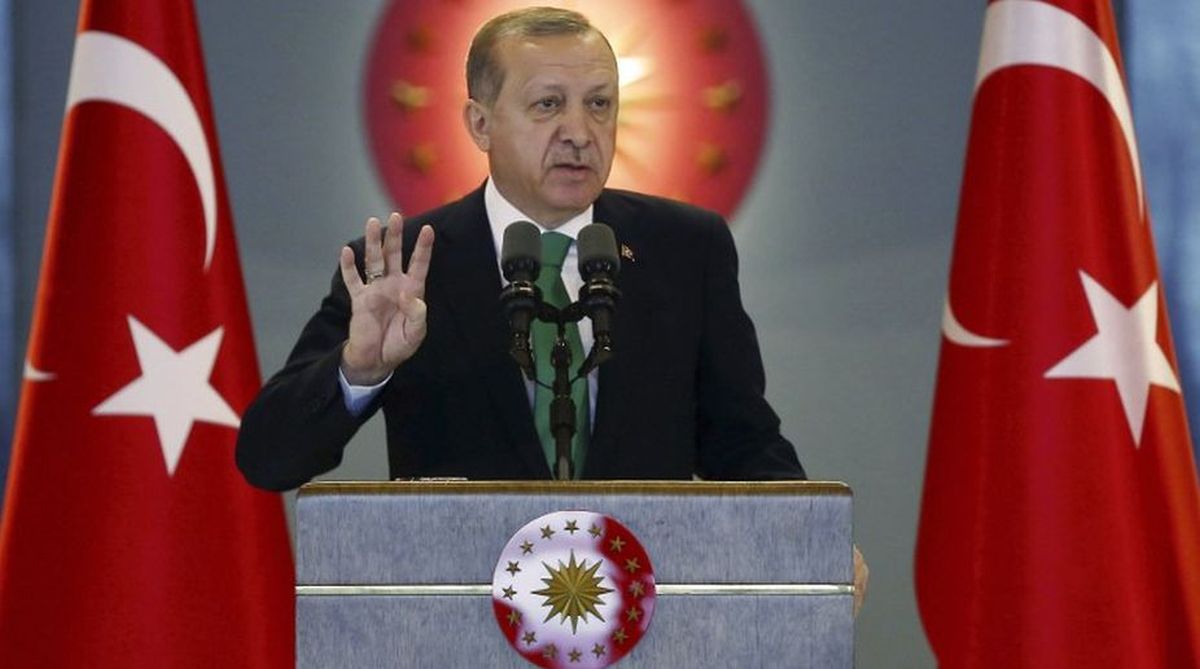Peace, stability in Middle East vital for entire world: EAM Jaishankar
Jaishankar is in South Africa to participate in the G20 Foreign Ministers’ Meeting from February 20-21.

Turkish President Recep Tayyip Erdogan (Photo: AFP)
President Trump’s head-on confrontation with Turkish President Recep Tayyip Erdogan over the detention of American pastor Andrew Brunson and other points of contention is a marked departure from his predecessors’ approaches to U.S.-Turkey relations. It is also welcome and long overdue.
Washington’s relations with Ankara have deteriorated over the past 20 years, in particular since Erdogan came to power in 2002 after the formation of his AKP Party. Turkey’s detention of Mr. Brunson on trumped up espionage charges relating to the attempted 2016 coup targeting Erdogan has poured fuel on the fire.
Advertisement
Currently, Pastor Brunson is being held as a potential trade for the exiled Pennsylvania-based Islamic cleric Fethullah Gulen whom Erdogan asserts was responsible for the unsuccessful effort in 2016 to oust him from power.
Advertisement
Unfortunately, past U.S. administrations have tolerated Turkey’s misbehavior as if assuming that Ankara would conduct itself like a partner if Washington treated it as an equal that shared the same interests and values. Yet, these accommodations by Washington over the years did little to make Ankara behave like an ally.
There is no question that the U.S.-Turkey relationship has been an important alliance for over six decades, with fellow NATO member Turkey serving as a needed bridge between the Middle East and the West. However, Turkey has changed and has developed interests and objectives that are at odds with Washington and NATO.
In recent years Turkey has countered U.S. efforts to fight ISIS in Syria. It has opposed the counter-ISIS role that the U.S. has given to the Syrian YPG Kurdish militia, a partner of the PKK terror organization that has waged a 40-year insurgency against Turkey.
Additionally, Ankara has abandoned cooperative ties with Israel in exchange for a toxic, hostile approach to the Jewish state, and has even developed what Erdogan calls “strategic” relations with Tehran, helping it to circumvent U.S. sanctions.
Turkey under Erdogan has also made a concerted bid to deepen relations with other U.S. adversaries, namely Russia and China, and has worked to separate itself from the West and establish itself as a Middle East power with its own set of strategic objectives.
Turkey has changed domestically as well. After a number of constitutional changes, all political power now flows to Erdogan who regularly represses and detains political opponents and censors the media.
All of this makes President Trump’s doubling of tariffs on Turkish aluminum and steel imports necessary and important. For good measure, U.S. Secretary of the Treasury Steven Mnuchin announced recently that the U.S. is preparing additional sanctions against Turkey.
The tariffs and sanctions are also well-timed as they have caused the Turkish lira to lose value beyond its declines of the past 12 months, unsettling markets. Over the past year, the lira has fallen over 45 per cent at a time when U.S. interest rates are rising. The decade of free flowing, easy funds fueled by low interest rates that Erdogan played with for big infrastructure projects, social spending and buying up supporters has come to an end.
Complicating matters, much of what Turkey owes is foreign currency-denominated debt that is owned by various banks in Spain, Greece, Italy and elsewhere in Europe.
Facing the headwinds of paying down all of this debt during a period of rising interest rates, Erdogan has announced that Turkey is under economic siege and has blamed the U.S. for Turkey’s falling economy. He has also encouraged people to boycott U.S. electronics and to support the lira by trading their dollars and euros for the Turkish currency.
While Qatar has arranged $15 billion in economic aid for Ankara, it is a paltry, insufficient sum when Turkey’s overall fiscal condition is taken into account.
It is likely that at some point Turkey will need a bailout. The IMF is a traditional source of funds although Ankara is likely to have reservations about an IMF rescue given Washington’s strong association with the organization.
A bailout by Moscow is improbable given its underperforming economy and Beijing is currently facing a slowdown amid its trade war with Washington.
A possible outcome to the current Trump-Erdogan standoff is Washington providing Ankara with a face saving off-ramp to their untenable position.
This may involve some sanctions or tariff relief in exchange for the release of Mr. Brunson and U.S. government employees as well as a renewed discussion of American and Turkish roles in the broader region and possible areas of cooperation.
However, as long as Erdogan is in office, the U.S. and Turkey will find it difficult to have a productive relationship built on trust and common interests. There will likely be more clashing of horns down the road on issues ranging from the Middle East and Russia, hostage diplomacy, Mr. Erdogan’s increasingly autocratic ways as well as economic and trade policy. There will continue to be a need for Mr. Trump’s new, aggressive approach towards Ankara as Erdogan moves Turkey out of the West’s orbit and pursues its own core objectives.
The writer is the Associate Director of the Tribal Administration Program at Claremont Graduate University.
Advertisement